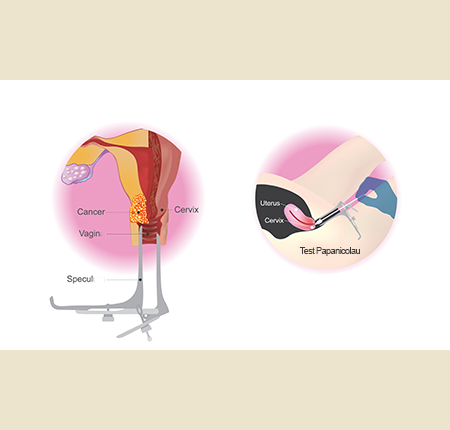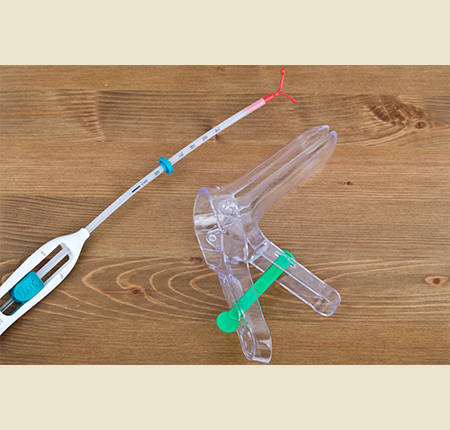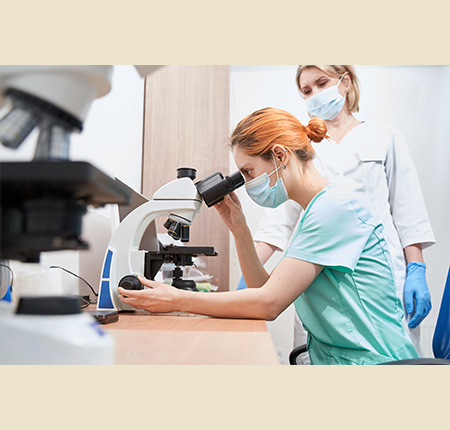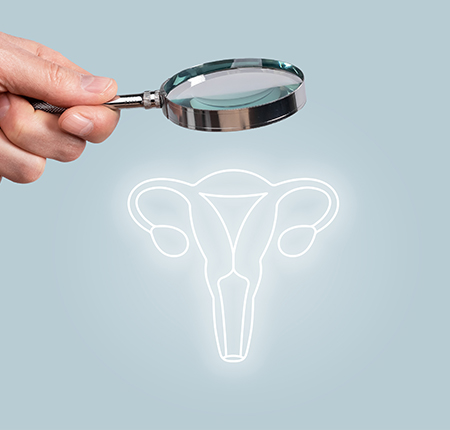
Babes Pap test (PAP) - What is it and how is it done?
They say prevention is the first step to health. For this reason, the importance of the Pap test is always emphasized and it is recommended that it be done regularly. With its help, simple infections can be detected, but also more serious conditions such as cervical cancer in its earliest phase. If it is diagnosed early, the chance of treating this type of cancer is very high.
Basically, the Pap test can save your life.
What is the Babes Pap test (PAP)?
The Babeș Pap test is a quick, painless procedure and is the best way to detect the appearance of cervical cancer. If done regularly, every year, abnormal cells can be detected at an early stage, before they turn into cancerous lesions. This greatly increases the chances of treating and successfully overcoming the disease.
The gynecological control and this test are the most important and effective gynecological investigations that a woman should do annually to be sure that she is well.
Brief history - how did this test come about?
DID YOU KNOW THAT..
The fourth most common type of cancer diagnosed among women worldwide is cervical (or cervical) cancer? According to the World Health Organization, approximately 99% of cases are caused by infection with the human papilloma virus (HPV).
The Babes-Papanicolau test is the result of independent studies by Aurel Babeș (Romanian doctor) and Georgis Papanikolaou (Greek morphopathologist). In 1926 Babeș speaks for the first time about the importance of analyzing cervical cells under a microscope, performing the first tests, and a year later Papanicolau perfects the method and creates a scale for measuring the results (from 1 - normal to 5 - suspicion of cancer or cancer) . In 1943, the test is introduced to the market in the form in which we still have it today.

Who is the PAP test recommended for?
The test is recommended for all women from the age of 21 or, if their sex life started earlier, 3 years after the first sexual contact. An active sex life significantly increases the risk of HPV infection (Human Papilloma Virus, which is a type of infection that can occur in the vagina), which is why, in general, if the results are good, the test should be repeated every 3 years.
However, there are certain risk factors on the basis of which more frequent investigations are recommended:
the presence of the HIV virus in the body
weak immune system due to chemotherapy or organ transplant
smoking
if the test shows the presence of precancerous or cancerous cells
general details about this aspect, at what age it can be done, if there are people who need this test more (eg: sexually active people, people with various symptoms, etc.)
When is the Pap test done?
For this test, it is good to schedule the visit to the gynecologist between days 10-20 of the menstrual cycle (day 1 being the first day of menstruation). It is not recommended to have sex 24-48 hours before since it can cause cervical inflammation and other minor changes that influence the results.
In general, if there are no worrying signs, tests should be done as follows:
between 21-29 years: once every 3 years
between 30-65 years: once every 3-5 years
if you are over 65 years old: the doctor may recommend not taking the test if the results are good
Price - How much does a Pap test cost?
The price of the Pap test starts, on average, from 50 lei. It can vary depending on the analyzes you want, if you want to do an HPV test along with it, as well as the clinic you choose.
Preparation for the Babes Pap test
It's time to understand what preparation you need when you choose to do a Pap test.
First of all, it is essential that the appointment with the gynecologist is made at the correct time of the month. Thus, you should find a suitable date anytime between the 10th and 20th day of the cycle (day 1 is considered the first day of menstruation).
Second, as we mentioned earlier, it is recommended to avoid sexual contact 24-48 hours before the test, since it could influence the test results. Moreover, do not use tampons, ovules and do not do vaginal washes - anything you insert into the vagina can change the quality of the collected sample.
What is the procedure and how is the Pap test done?
The procedure is considered simple and painless for you and takes between 10 and 20 minutes. We help you understand what to expect.
In the gynecologist's office, you will lie on your back with your knees bent and your calves fixed on the special support. The doctor will use a speculum (a plastic or metal instrument) to widen the vaginal walls, then insert a fine brush with which, by rotation, he will collect the sample of cells from the cervix. This will be put on a glass slide, stored in a vial and sent to the laboratory for analysis.
There are two types of PAP tests: conventional and liquid. 
Conventional PAP test
The conventional PAP test means that the collected sample is fixed on a glass slide and analyzed in this form.
PAP test in liquid medium
In the case of the test in a liquid medium, the sample is placed in a vial that gives it special conditions. This does not affect the quality of the sample in any way, but at the same time allows the analysis of high-risk HPV strains.

Conventional PAP vs. in liquid medium - which is the most effective?
What is the difference between the two? The liquid test has several advantages over the conventional one:
reduces the possibility that the sample will be considered unsatisfactory for interpretation and thus require a new collection;
allows the simultaneous testing, from the same sample, of the presence of high-risk HPV genotypes.
From a medical point of view, both tests are considered effective.
Expectations after the Pap test (PAP)
As in the case of the HPV test, the results of the Pap test can be known after 1-2 weeks.
It is good to know that after the Babeș Pap test you can immediately resume your daily activity. Although the procedure is not painful, you can expect some discomfort (pressure in the pelvis) and even light bleeding afterwards. These are not caused by the test itself, but by inflammation of the cervix or cervical area.
Your day doesn't have to be put on hold by discomfort like spotting or vaginal discharge, now you can trust ENROUSH organic menstrual products. Created according to the shape of your body, for the love of your comfort and absolute freedom, we made sure that the daily absorbents created from 100% certified organic cotton exceed your expectations in terms of protection, freshness and love. Give your intimate area the care it needs, no perfume, chemicals or plastic, just natural super-absorbent, pH-neutral interior, guaranteed hypoallergenic.
Our products are approved by gynecologists and even one of our beautiful clients tells you what a change they bring to your life:
I've always looked for healthy alternatives when it comes to cosmetics or everything that touches our skin, especially sensitive areas. Many products contain ingredients like fragrance and this is not good for us. Since using ENROUSH absorbent pads I honestly have no more problems with heavy bleeding and have started recommending them to my family who now also use ENROUSH products. I have been using them for 1-2 years and would never go back to conventional products. Thank you for taking the initiative to create this product! Nicole
HPV Testing & Pap Test Results
The Pap test and the HPV test are usually done together. The PAP test has the role of detecting the presence of cancerous or precancerous cells in the cervix, while the HPV test detects the presence of the human papilloma virus. The HPV test also tells us if a possible abnormal Pap test result is caused by a type of papilloma virus that carries a high risk of cancer.
Pap test results are measured as indicated below.
PAP type 1 - Normal results
The PAP type 1 result shows us that everything is within normal parameters - the cervix does not show inflammation and there is no need for further investigations.
PAP type 2 - Slightly modified
It is possible that the test has detected the presence of slightly abnormal cells, but which are most often caused by an infection other than HPV or even inflammation. The cervix can become inflamed if you had sex less than 48 hours before the PAP test. The doctor may recommend repeating the test after a few months.
PAP type 3 - Inflammation
In PAP type 3, the cervix may be inflamed and may show slight abnormalities. It is an easily treatable condition and can again be due to intercourse if it took place less than 48 hours ago. Your doctor may recommend that you repeat the Pap test in a few months.
PAP type 4 - Precancerous changes / Abnormalities
PAP type 4 means the presence of abnormal cells or precancerous changes, such as:
ASCUS - a fairly common result that most often has its root in an HPV virus. Another test in 4-6 months and an HPV test may be recommended.
L-SIL (low-grade squamous intraepithelial lesion) - indicates a certain amount of affected cells. In this case, the Pap test will be recommended again in 6-9 months, and if the situation persists, a colonoscopy.
H-SIL (high-grade squamous intraepithelial lesion) - shows a higher number of affected cells than L-SIL, which is why a colonoscopy and biopsy will most likely be recommended.
Pap smear type 5 - Suspicion of cancer or even cancer
When we talk about PAP type 5, suspicions of cancer arise and most likely cancer cells are already spread in the cervix.

What happens if I have HPV?
HPV (Human Papilloma Virus) is a common sexually transmitted infection. It may not show up in the body at all because if it is present in a mild form, it will be eliminated naturally. We talk extensively about HPV infection and the vaccine here.
Like an abnormal PAP test result, a positive HPV test does not necessarily indicate the presence of cervical cancer, but only certain HPV genotypes that cause precancerous changes in cervical cells. Only if these problems are not treated in time, correctly, they lead to cancer. Therefore, simply being infected with HPV does not necessarily lead to the development of cervical cancer. Infection is common, it is known that 8 out of 10 people are infected during their life.
Remember that vaccination against the different types of HPV that can cause cervical cancer is useful for preventing HPV infection in people who are not yet infected.
Cervical cancer prevention
It's good to know that we have many options for testing and treatment in emergencies, but prevention is even better. For cervical cancer, we have various methods by which we can protect ourselves:
condom use
the HPV vaccine
periodic check-up at the gynecologist
avoiding smoking
As the subject can be considered difficult for many of us, it is important to get information only from reliable sources. For more clarity, we also wrote the article What is cervical cancer and how can you prevent it? and we invite you to read it. Better to know, so you can prevent.
Frequently asked questions
If we haven't answered all your questions about the Babeș Pap test yet, we're answering you right now!
How long does a Pap test take?
The harvesting procedure takes between 10 and 20 minutes, and the results come, on average, in one to two weeks.
At what age is the first PAP test done?
Doctors recommend that the PAP test be done from the age of 21, but if you started your sex life early, it is good to do it 3 years after the first sexual contact.
How safe is the pap smear?
Like any laboratory test, the Pap test can give erroneous results, but these cases are very rare. For the most part, the results are effective and the diagnosis is reliable.
If I had the HPV vaccine, does that mean I no longer need to do the PAP test?
Even if you have had the HPV vaccine, it is recommended that you have a regular PAP test. This vaccine prevents infection with certain types of HPV, but there are other types of abnormalities that can occur, which can be detected by the Pap test.
Taking care of ourselves means preventing, not just treating. Take care of your body, visit your gynecologist regularly and don't postpone the tests that can save your life.























